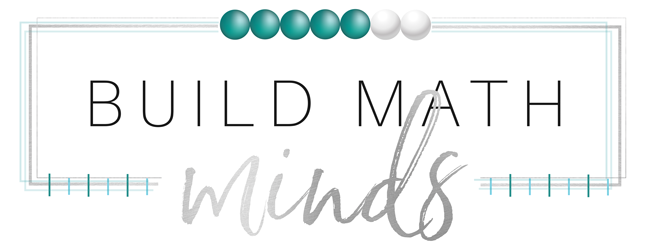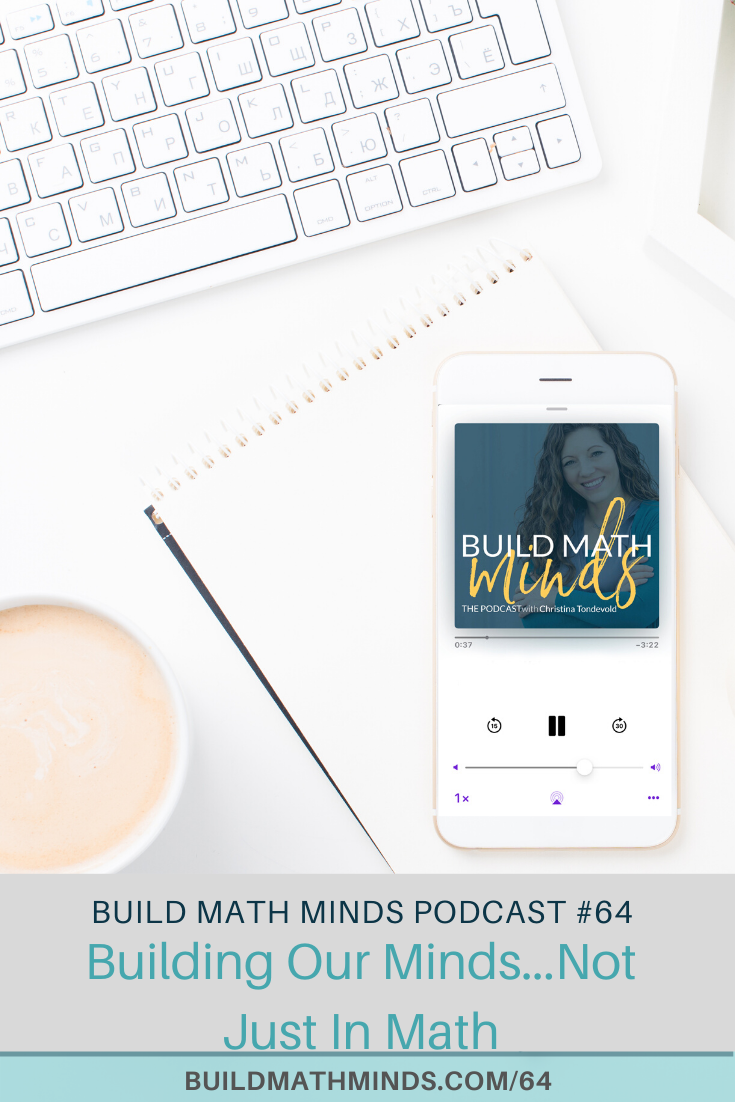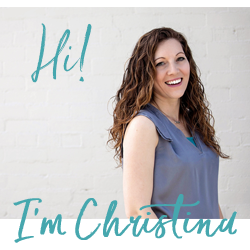Resources mentioned in this episode:
Marian Dingle’s website
Marian Dingle on Twitter
Zenned Math Teachers FB group
Zenned Math website
Dr. Kristopher Childs on Twitter
Dr. Kristopher Childs’ website
Sheldon L. Eakins, Ph.D on Twitter
Sheldon Eakins website
Welcome fellow Recovering Traditionalists to Episode 64. Today I am talking about Building Our Minds…Not Just In Math.
Welcome to Build Math Minds the podcast, where fidelity to your students is greater than fidelity to your textbook. I’m your host, Christina Tondevold, the recovering traditionalist and BuildMathMinds.com Founder, where my mission is to change the way we teach elementary math to our kiddos. Are you ready to start building math minds and not just creating calculators? Let’s get started.
Just like the opening of this podcast always says, this podcast is about Building Math Minds. In my videos I say we have to “build our math minds, so we can build the math minds of our students.”
Well today is still about building our minds, but it doesn’t pertain to math. If we want to build the minds of our students we first need to build our minds…in all areas.
This past week has been a lot of reflecting and learning about racism. I want to share with you some BIPOC (Black, Indigineous and People of Color) educators that I’ve been learning from and will continue to learn from even after this leaves the mainstream news feeds.
There is a lot I’ve been working on and discoveries I’ve made. I’m not going to go into detail about all of them or even defend my beliefs because just like every week, this podcast is meant to spark something and then let you dig deep into it and do the work and build your understanding for yourself.
I’m not going to be perfect and say and do the right things as I work to become anti-ractist (there is a difference between not being racist and being an anti-racist). In fact, for this podcast I have a trusted friend who has helped me a lot during this last week and I was going to send my thoughts to her to ask “is this okay to say?” but I didn’t. Because that isn’t what we should be asking BIPOC right now. It’s not her job to make me feel okay about what I say and do. It’s my job to put in the work, talk about what I’m learning, and learn from mistakes I make along the way. Growing our understanding of anything puts us in uncomfortable spaces, but we need to get uncomfortable.
I want to encourage you to learn more and build your mind around racism because it affects so much of what goes on within schools. I’d love for you to comment on that page to let me know who you are learning from.
I want to talk about two big things I’ve been working on and will continue to work on. I’m not perfect and there’s a lot more that I can and will be doing for the years to come, but these items are of top priority to me:
- Becoming an Advocate and Ally
The Build Math Minds Virtual Math Summit is an online professional development conference I put together every year for elementary educators. When I first started it, I asked people that I know if they would do me a favor and do a presentation. That first year the speaker line-up wasn’t very diverse. A few years later, I had a few conversations with Marian Dingle. She helped me see that the speaker line-up was a reflection of my ‘inner circle’ and I needed to widen my circle. I did a little. But not enough. When we released the speaker line-up for the summit this year, I knew it wasn’t diverse. I told myself that I had invited diverse speakers, but I couldn’t control if they said yes or if they submitted everything in order to be in the summit…that was up to them.
But then this week, I was listening to a Facebook Live by Rosalba McFadden in the Zenned Math Teachers Facebook group. She said something that made me realize that a) maybe my system and how the summit is set up, is deterring BIPOC and other marginalized groups from wanting or having the ability to become a presenter at the summit and b) the systemic racism makes it very difficult for BIPOC to even get to the point that they are seen as ‘experts’ in order to be asked to be a speaker.
This is a big concern to me and something I want to rectify. I know that right now the focus is on Black lives, and it should be but there are so many marginalized groups. I have a few ideas but this is part of what I’m learning: how can I become a better advocate and ally for marginalized educators and students? How can I use the platform of the Virtual Math Summit to do that work?
- Stop Saying ‘I Don’t See Color’
I’ve seen this a lot on social media and I know I’ve said it silently in my head. I really didn’t realize the impact of that until just the other day. I have a group of friends that we have known each other since we were in elementary school. We communicate every day with each other in a group video chat app. We all are white girls who grew up in Idaho, except one of us.
Mel went to school with us in elementary school, moved away, then came back in high school. She was my Matron of Honor in my wedding. Mel is mixed race. And I’ve never once asked her about her race or racism.
I sent the gals a message in our group video chat this weekend asking Mel if she ever experienced racism and I asked her to share her experiences with the group if she felt comfortable doing so. I also apologized for never asking her. Someone I’ve known for over 30 years and I’ve never had a conversation with her about racism. After she had shared her stories, another friend in the group thanked her for sharing, apologized for never asking either and made a comment that stuck with me. She said she hadn’t ever asked because Mel just always seemed like ‘one of us.’ She didn’t see Mel as different but because of that, we’ve never been there for her to help her navigate those differences and the experiences she has had because of those differences.
After this interaction I happened to watch a video by the author of White Fragility, Dr. Robin DeAngelo in which she discussed this very issue. She talks about the difference between Color Blind and Color Celebrate. So when we say that we ‘don’t see color’ we are negating that person, their heritage, their experiences, and on and on. We need to see and honor their color. We need to do that for the people in our lives and we need to do that for the students in our classrooms.
Again I’m not the expert here, so please go learn from others. I mentioned Marian Dingle & Rosalba McFadden. I’ve also learned a lot this past year from Dr. Kristopher Childs and recently started learning from Sheldon Eakins and the Leading Equity Center. I’m also getting books to read, like White Fragility. I don’t have bookstores near where I live so while I was waiting for my book to arrive I watched that video by the author and I’d also encourage you to go watch it.
Subscribe and Review in iTunes
Hey, are you subscribed to the Build Math Minds Podcast, yet? If you’re not, make sure to do that today because I don’t want you to miss any episodes! Click here to subscribe to the podcast in iTunes.
While you’re there, don’t forget to leave a review on iTunes too. I would love to know your thoughts and how we can make sure that we give you content that you will really enjoy.
To leave a review, head over to iTunes and click on “Ratings and Reviews” and “Write a Review.” I can’t wait to hear your thoughts about the podcast.





While listening to your podcast and reading it in print, I had a thought: I’m into Math, as you are, but I love to play with words. I enjoy finding acronyms. When I see a word, I like to find an anagram. What stood out just now was the word RACIST, and it suddenly occurred to me that the best way to counter that (to be an anti-RACIST) is to be a CARIST! Just switch the C and R. The definition of my new word, CARIST, is obvious: A CARIST is one who cares! We could expand on that, but the simplicity of the word perhaps speaks for itself. To fight and counter RACISM, I must exhibit and promote CARISM. I must be a CARIST, in what I say and what I do. I must reflect it and promote it with calm passion!
Thank you for your honest reflections and for sharing information and people to follow. Nicole Hannah-Jones is another person to check out. I think she is fabulous—speaks the truth.
Sorry, it is Nikole—above
This book isn’t education-specific, but I highly recommend “Me and White Supremacy” by Layla F. Saad. It’s a book you “do”, by reading through each of the 28 daily sections and asking ourselves some challenging questions. It opened my eyes, as a white person, to the validity and significance of so many concepts that had been just “buzzwords” to me before, and revealed a lot of things about myself that are difficult but necessary to examine.
Thank you for doing this podcast and for setting an example of being willing to do this uncomfortable work of becoming anti-racist.
Thank you for highlighting this important work. I, too, am doing the work of becoming aware. I value my role as a teacher enough to be the best person I can be for all my students. My whiteness does not exclude or set me apart, but rather, demands that I seek deeper understanding of issues and events. Good to be on this journey with you!
Thank you for Podcast #64 and sharing your personal reflective thinking about racism and beginning your journey to becoming anti-racist. You also gave tools to those who follow you by directing readers to sites for learning more about BIPOC, authors, additional information, clarification, and exploration. As an educator, I appreciate your help in a deeper understanding of ‘anti-racist.’